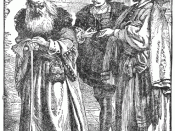Shylock's Downfall
In Shakespeare's play The Merchant of Venice, Shylock, the Jewish money lender, is only partly responsible for his own downfall. In fact, he is responsible perhaps to a lesser extent than the other parties. It is true that Shylock set the terms of the bond that was to eventually destroy him, and throughout his life had led a cruel and merciless vendetta against the non-Jews. It is also true that Shylock's very personality and conduct drove people from him, and evoked a strong sense of unease, even hatred. However, in The Merchant of Venice, two other parties, and a number of factors, conspire against him, and, as such, are also accountable for his demise. For one, the Christians, led by Antonio and Bassanio, and, importantly, Portia, persecute and torture the Jew on a daily basis. Their campaign against Shylock is perhaps even worse than his against them.
Also, it seems that all of society is against Shylock. Society itself is anti-Semitic, and Shylock is baited by a number of discriminatory and seemingly unjust laws. Also, a number of events during the trial, such as Portia's guise of a lawyer, conspire, illegally, against Shylock, and contribute directly to his downfall.
A number of factors which indirectly contribute to Shylock's downfall of occur even before the timeframe of the play. As Antonio approaches, to their first encounter in the story, Shylock, speaking to the audience, makes it clear that not only is there a deep-set animosity between him and Antonio, but that he dearly thirsts for revenge. As he shamelessly tells the audience, "If I can catch him once upon the hip, I will feed fat the ancient grudge I bear him." (Act 1, Sc. 3). He gives no reason other than "I...



Similarity of Titles and Duplication of Content
This is the third time in the past couple of days that I've read one of your essays on this subject (the first essay which I rated as good was titled "Shylock's Downfall". To what extent is Shylock responsible for his downfall in the play The Merchant Of Venice?) Not only might the similarity of the titles be confusing to some, but also the three essays may have been appropriately combined into one essay since the subject matter is similar.
6 out of 6 people found this comment useful.